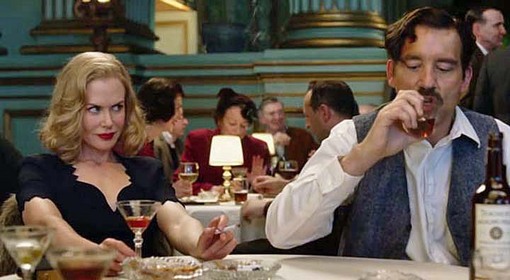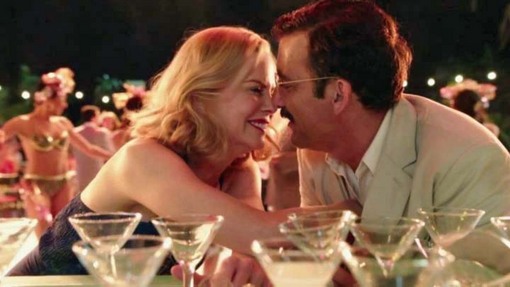“Hemingway & Gellhorn (160 minutes) debuts on HBO May 28th, and will be available on HBO Go and HBO On Demand May 29th.
“If two people love each other, there can be no happy end to it.” — Ernest Hemingway
Philip Kaufman’s epic HBO movie “Hemingway & Gellhorn” is old-fashioned, corny as hell and not above using cliché. None of these characteristics is necessarily a bad thing, especially if the filmmakers know they are employing them. This film evokes the rainy Sunday afternoon old-movie fare I grew up watching on TV, movies with a tough, macho hero, a smart, brassy dame and the undeniable chemistry between them. Kaufman updates the formula to modern times with belts of profanity and jolts of sex, but “Hemingway and Gellhorn” maintains the feeling of an era long since passed, wherein its leads could have been played by Gable and Harlow or Bogie and Betty Bacall.

The titular characters are Ernest Hemingway and his third wife, Martha Gellhorn. Gellhorn is widely considered one of the greatest war correspondents in journalism history, covering wars well into her 80’s. Yet, she was constantly overshadowed by her more famous ex-husband. Theirs was a torrid affair, started while Hemingway was married to his Catholic second wife and continuing through their coverage of several wars. “We were good at wars,” Gellhorn said, “and when there was no war, we made our own.” The screenplay, by Barbara Turner (“Georgia“) and Jerry Stahl (“Permanent Midnight“) is filled with prose like this, and I enjoyed devouring every purple morsel of it. “Hemingway and Gellhorn” even opens with the now-elderly Gellhorn telling us what a lousy lay she was.


One wouldn’t know it based on the heat resonating from the film’s leads. Clive Owen plays “Papa” and Nicole Kidman plays Gellhorn. They meet in a Key West bar called “Sloppy Joe’s,” and their first scene together is a master class in using words as foreplay. Kaufman’s camera focuses, and not for the last time, on Kidman’s posterior, but it’s her interaction with Owen that raises the temperature. “There’s too much rum in this rum,” says Gellhorn after accepting a drink from Hemingway. “People don’t drink here to get drunk,” he says. “They drink here to stay drunk.” Gellhorn escapes with her makeup unscathed, but the seeds of desire have already been planted. Even the second Mrs. Hemingway (Molly Parker) notices it when Gellhorn shows up for a party at the Hemingway home. After answering the door, Parker stresses the “MRS.” In “Mrs. Hemingway,” as if saying “get the point, bitch?!”

At the party, Gellhorn meets author John Dos Passos (David Strathairn) who is making a documentary about the Spanish Civil War. After seeing footage from the documentary, and hearing firsthand accounts from Capa (Santiago Cabrera) and Joris Ivens (Metallica’s Lars Ulrich), Gellhorn decides to try her hand at reporting from the war zone. In voiceover, the elder Gellhorn cites her time on this war front as one of the two events that profoundly changed her; the other was covering the Allied invasion. In the former, it’s her unseasoned view of the heroism of those defeated while fighting for what they believe. In the latter, her seasoned perspective is shaken to the core by man’s inhumanity to man. Both are credibly depicted using sprawling sets, seamless integration of the actors into real footage, and the superb film and sound editing of the genius Walter Murch.


Hemingway, a seasoned vet of this type of coverage, meets Gellhorn in Spain. Clearly amused by both her inexperience and the “war correspondent” designation Gellhorn finagled out of Collier’s magazine, Hemingway takes on the role of protector and mentor. Their hotel is full of hookers and desperate men looking to cling to a warm body, and body-warming whiskey, before marching to their inevitable demise. Gellhorn meets soldiers like Brooklyn (Eric Schneider) and the goat-carrying Hungarian (Edin Gali), men whose fates contribute to pushing her passion for covering the victims of war into obsession. After risking her life to save a little boy (to whom Hemingway gives his whiskey flask), Owen looks at the camera and announces, “She’s the bravest woman I ever met!” It’s a line that’s cheesier than Wisconsin, but not out of place in a movie like this.

Hemingway’s opinion of Gellhorn swings from bravery to beauty, and the eventual consummation of their passion visually sums up the landscape of both the relationship and the movie that contains it. Gellhorn said she was the worst lay on five continents, but Kaufman and his actors have other ideas. While trying to escape the crumbling hotel during an attack, Hemingway and Gellhorn are overtaken by literally explosive passion, hungrily devouring each other as bombs shake their love nest. Kaufman, a director unafraid of adult sensuality, harkens back to the best scenes of his earlier erotic wartime feature, “The Unbearable Lightness of Being.” No strangers to nudity, Kidman and Owen live in the moment, bypassing the absurdity of the situation and pulling us hungrily along. “Is this what you want?” Gellhorn asks. “This is what I need,” growls Hemingway. The scene has a tactile quality; when an explosion sends debris raining down on the lovers, Kaufman’s framing puts his actors close enough for the viewer to reach out to brush the plaster from Kidman’s hair. It’s ripe to the point of eye-rolling. It’s also magnificent.

At the center of “Hemingway and Gellhorn” is the oft-told tale of two people meant to be together but too stubborn to give an inch of surrender in either direction. The irresistible force meets the immoveable object, but in this case, nothing gives. Gellhorn admits her own stubbornness in the narration, but Hemingway has a rep to uphold, so no such confession is forthcoming, at least not verbally. A shot of Hemingway outside Gellhorn’s room, his body in a stance of exasperated surrender despite banging his head on her door, speaks volumes to his complicity in the demise of this relationship.

The actors are first-rate, down to the supporting roles. As Gellhorn, Kidman would appear to have an easier role to play, if only because we are not as familiar with Gellhorn as we are with Hemingway. However, this is her story, and she slings the weight of it across her shoulders and carries it to safety. This is Kidman’s best work in years, smart, brassy, funny, sexy and tough. She brings her A-game because Owen’s showier role must be legendary, a larger than life evocation of masculinity suited for the name Hemingway. Cinematographer Rogier Stoffers introduces Owen in a desaturated fishing sequence that culminates in an explosion of bright red blood. Owen’s Hemingway grabs the bull by the horns, resisting cliché just barely enough to feel the breath of caricature on his neck. His Russian Roulette pissing contest with an uncredited, equally macho and over the top Robert Duvall is a highlight of the film. Anyone with a romantic appreciation of the male gender will swoon at Owen’s constantly revealed chest hair. Everyone else can worship, as Kaufman’s camera does, at the altar of Kidman’s lower body, with its “legs that start at her shoulders.”

At 160 minutes, “Hemingway and Gellhorn” could afford to lose a few. But Stoffers and Kaufman know what they are doing, both combating and embracing the film’s corniness with their visual palette. This is a stunning film to watch, and to listen to, with technical masters doing bravura work. Their labors elevate and support without being so intrusive that we forget the humans at the center of this story. The special effects work and the art direction are also stand-outs.

At film’s end, the narration is revealed to be an interview. The interviewer asks Gellhorn about Hemingway, whose shadow she feels she has been under even 30 years after his death by suicide. (Gellhorn would also commit suicide.) Kidman, in her old lady makeup, conjures up one last bit of fiery passion, telling the interviewer how tired she is of being in the shade behind her famous ex-husband. This film is the corrective, bringing Gellhorn into the spotlight in a style befitting the era of her original heyday. Like I said, it’s epic, old-fashioned, entertaining and corny, the kind of movie I fell in love with as a kid. Old habits die hard.












